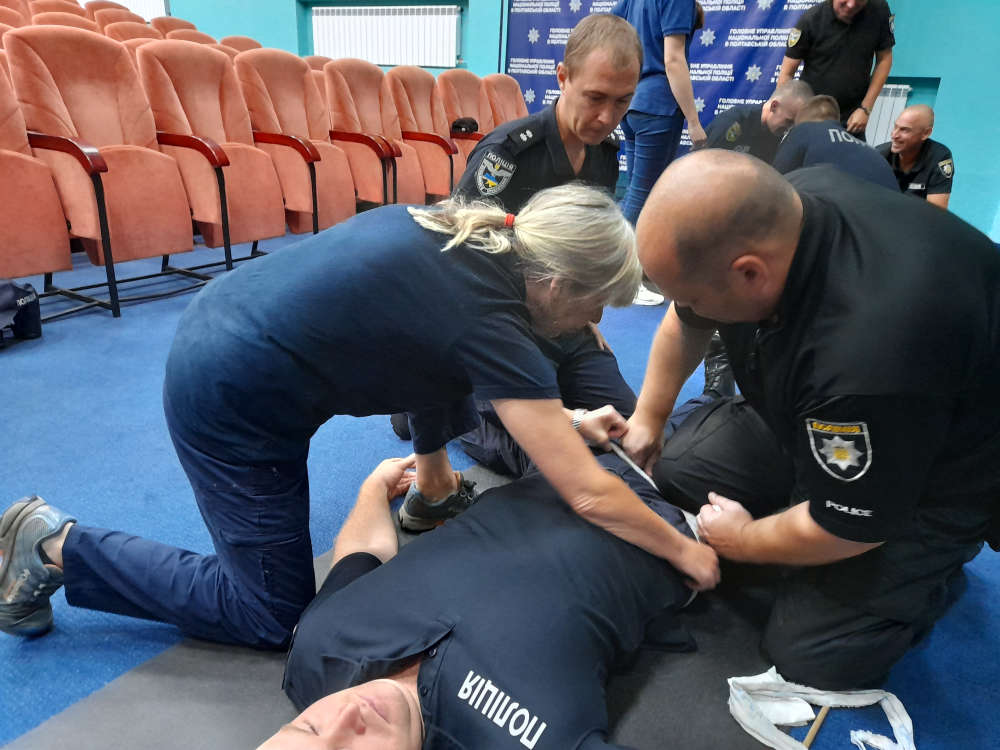
Paramedic Val Cochrane is back from the journey of a lifetime utilising her skills to help others in Ukraine.
Primarily Val was involved in training as many people as possible with the vital life-saving skills she possesses.
Val has been a paramedic with North West Ambulance Service since 1996.
Since 2015, she had worked as a community specialist paramedic across the Glossop area, based as a solo responder at Glossop Ambulance station.
She would respond to emergency call-outs, plus help with the care of people at home.
Part of her role included community training, passing on life-saving skills to the public, community and sports groups.
She was also a key member of the Glossop Defibrillator Group, campaigning to help raise funds for more defibrillators for the town and demonstrating to a wide range of groups how they are used and where they might be best located.
Val is also a member of the Glossop Mountain Rescue Team.
This week Val shares her incredible story of how she helped in Ukraine, including joining medical teams close to the front-line.
She heard harrowing first-hand tales of the war, shed many tears on an emotionally draining journey, but also made many friends in Ukraine as well as imparting invaluable skills during her time there and would return tomorrow to help again if she could.
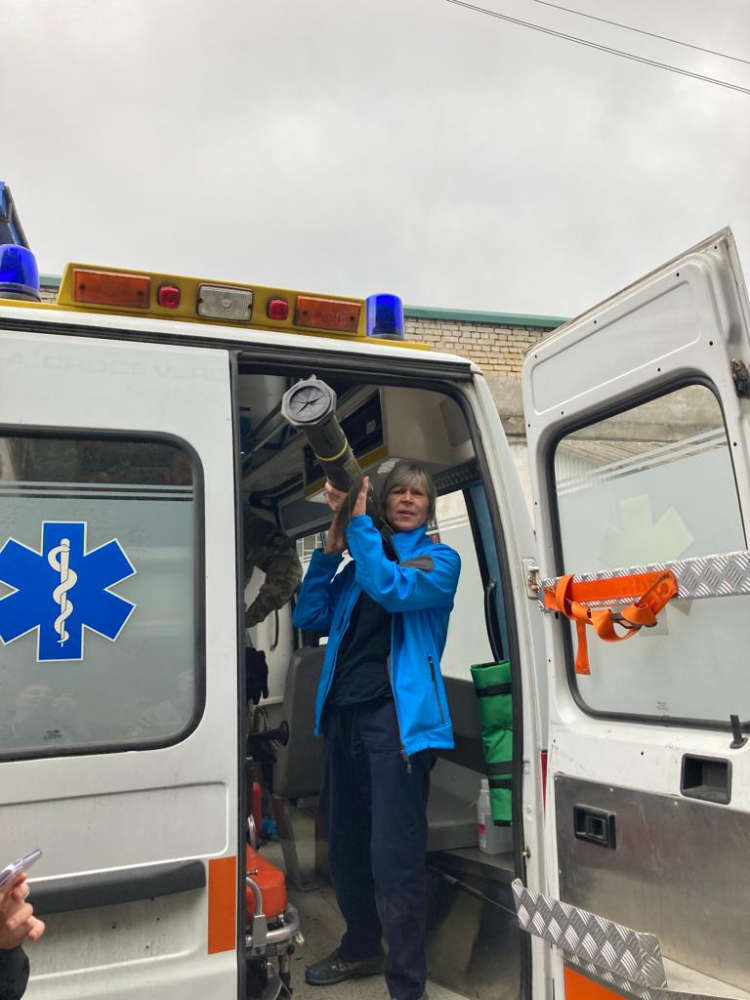
MAIN AIM: Paramedic Val Cochrane discovers ambulances in Ukraine carry slightly different equipment to the norm as they battle to help those on the front line.
Val's story
Val Cochrane, like so many of us, was moved to respond immediately the war began in Ukraine almost one year ago.
Sitting in the peace and warmth of her Glossopdale home with her dogs for company, she couldn’t believe what she was watching as she tuned into the news on February 24, 2022, when Russia launched its invasion.
“I sat in front of the television in complete horror and couldn’t believe this was happening in the 21st Century,” says Val.
“Later on, I watched Putin at a rally where they had transported people into a football stadium and there were all the Z emblems, and I thought if they were Swastikas, he would be Hitler. After the Second World War all these years later, you would have thought we would have learnt the lessons.
“I was filled with complete and utter horror and just thought I have to fight it. I’m not a soldier, but I could go and use the skills I have built up over the last 26 years.”
Val started off, like so many, by making donations, including to the Disaster Emergency Committee, UNICEF, UN, World Health Organisation, plus, as a dog lover, some organisations that were specifically to help animals.
However, Val was acutely aware that her skills would be of significant benefit to the people of Ukraine.
She registered with an organisation called UKMed, the frontline Medical Aid Charity, based in Manchester.
As a result she spent several months undertaking online humanitarian training. In June last year, UK Med advertised for paramedics to go to Ukraine and Val applied.
She signed up for three months, having arranged for a close friend to care for her dogs while she was away and headed to Ukraine last August.
“I was very excited and somewhat nervous, never having been into a conflict zone before. I suspected that being a paramedic in central Manchester on a Saturday night was probably going to pale in comparison,” said Val, who had been to India on a humanitarian aid trip in the past.
She flew to Krakow in Poland from Manchester where she joined another paramedic from the UK and they were driven across the border into Ukraine and onto Lviv where UKMed have a base.
Val said there was no sign of war there at that time and described the city as beautiful and the paramedics enjoyed dining out on their one night there.
But there was little time to take in any sights as the next day they boarded a train for Dnipro, in the east of the country and far closer to the conflict zone.
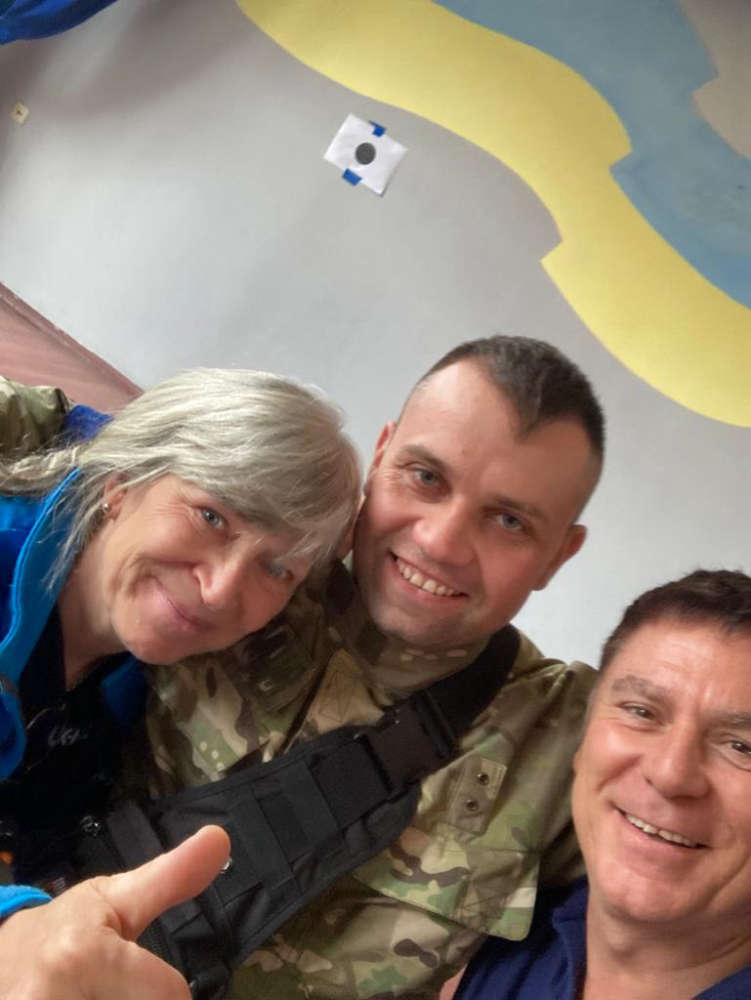
HELPING HAND: Val with Police Commander Olesandra and fellow paramedic Paul
The train journey alone took 18 and a half hours to complete, an introduction to just how vast Ukraine is.
Even though they were still a long way from the Russian border, it was here that Val heard her very first explosions of conflict.
Staying in a hotel in the city, Val stated: “There were two explosions and it turned out they were air defences taking out Russian missiles. We learnt that they try to shoot down the missiles over the huge river there so the shrapnel won’t fall over the city.”
However, Dnipro is only some 125km north of the Zaporizhzhya nuclear power station which had fallen into Russian hands, and Val said there were plans for a rapid evacuation if anything happened at the station. Although she speculated just how rapid an evacuation could be, considering the length of the train journey to reach their destination.
“We had an app on our phones alerting us to air raids, but when an alert came through we very quickly found the Ukrainian people weren’t reacting and they would just carry on as normal.
“So we very quickly became complacent about the sirens and alarms and occasional distant boom, which 99 per cent of the time were air defences taking out missiles.”
While in Ukraine, Val was involved in delivering a specific training course developed by paramedics who had been out earlier in the year. This focussed specifically on providing training in the treatment of major trauma. A lot of the course was therefore about showing people how to improvise in emergency situations, for example, what might double as a tourniquet to stop bleeding.
The training was delivered to emergency services but also other groups, including postal workers, railway staff and civilians.
Val said: “The very first session I delivered was to postal workers in a small town not too far from Dnipro.
“Towards the end of the session a chap at the back put his hand up and told us (we were always accompanied by local translators) that only the previous week he had come across a person with horrific abdominal wounds and he hadn’t known what to do, but now he did. He thanked us.
“But he’s a postman and he really should not have to be dealing with that sort of stuff.”
After several weeks, Val found herself moving on to a town called Poltava to the north of Dnipro to deliver further training.
“Poltava is a lovely city and at the time there were very little signs of war,” she said.
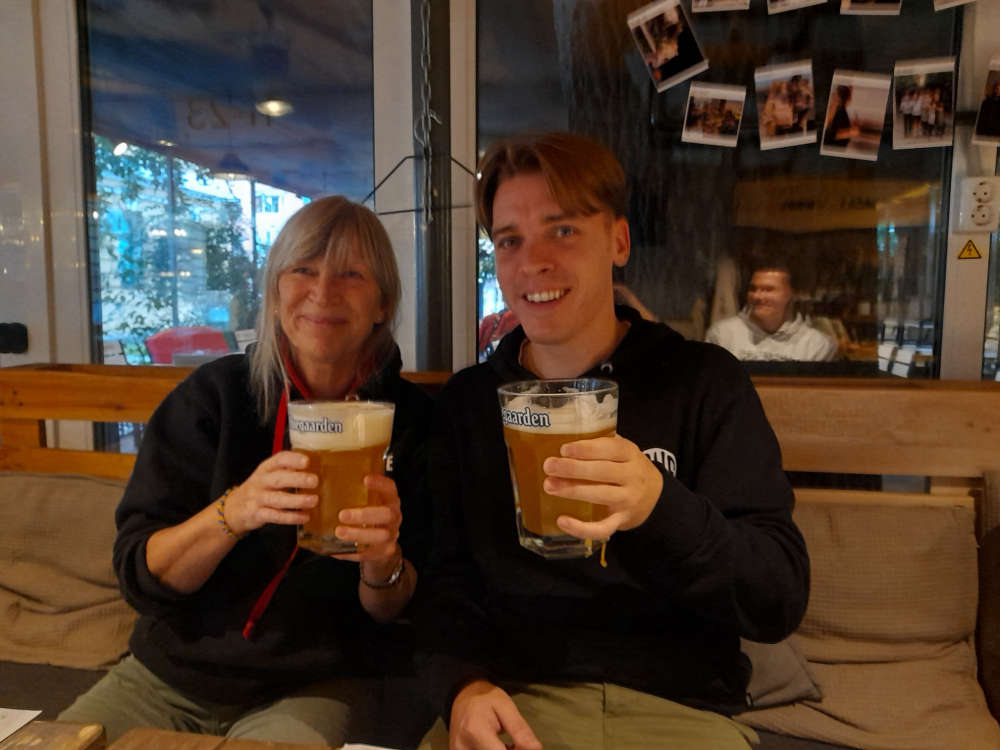
CELEBRATION: Val raises a glass with colleague Danny in Poltava after delivering the ‘Train the Trainer’ courses.
Over the course of two weeks there, Val worked alongside another paramedic to train all of the police officers across the city region, training up to 40 to 50 people each day with the help of interpreters.
Here Val and her colleague each received a ‘Letter of Appreciation’ in the shape of an engraved and framed tile to thank them for all they had done from the Chief of Police.
Val described the levels of appreciation from the population as incredible.
“If they heard you speaking English they would come up to you and shake your hand or hug you – they were so grateful that you were there helping.
“At the end of each training session people would come and give us little gifts and hugs – it was quite emotional. It makes you feel very humble and grateful that we are so lucky living where we are.”
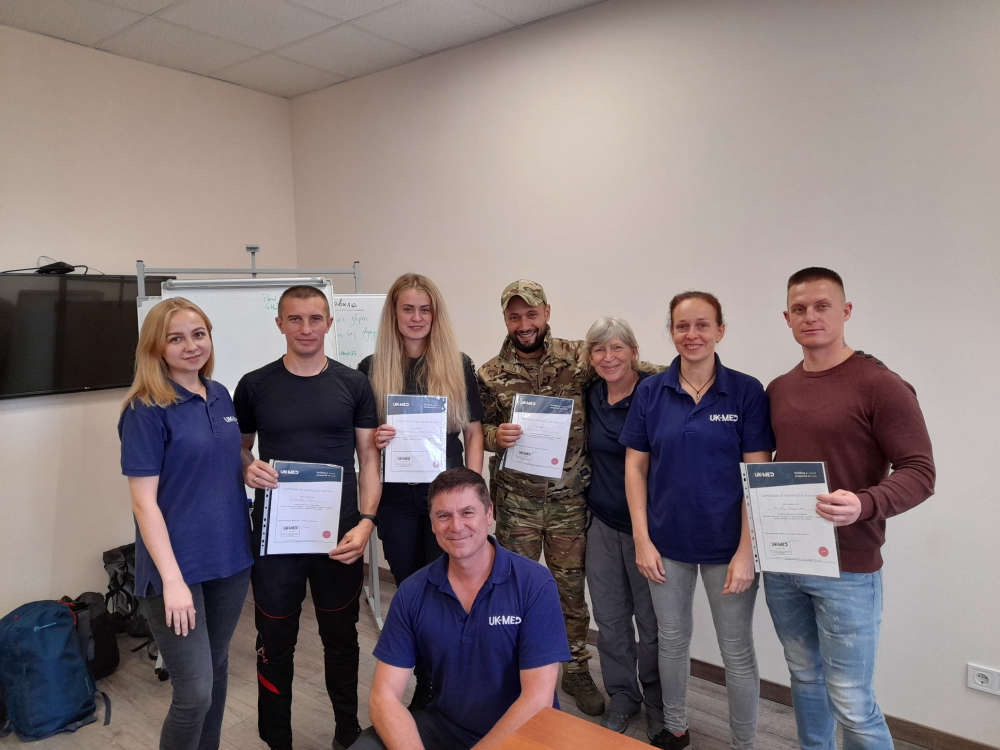
TRAINED: The group of successful Poltava police after completing the 'Train the Trainer' course
Val added: “One morning I was walking to the office with a nurse (from Romania who was also working for UKMed), we were chatting in English. A man in army combats was in front of us and he stopped, he asked us (in English) what we were doing and what our roles were.
“We explained and he thanked us for helping Ukraine and told us he was a combat medic, had been shot in the head but had recovered and was on his way back to the front-line. I shook his hand and wished him good luck.”
She added: “On another evening I took a local taxi from a restaurant back to the shared house I was staying in. The taxi driver asked me where I was from. I told him Manchester (most Ukrainians have heard of Manchester and it’s easier than explaining where Glossop is).
“He asked what I was doing there and after I explained he showed me a photo of him in full combat gear on the front-line. He explained he was on three weeks’ leave (but still working as a taxi driver) as his wife had just had a baby.
“He then showed me a photo of the baby and told me they had called their baby girl Victoria - because Ukraine will be victorious in the end, he said. I wished him and his family good luck and shook his hand... and I cried as I got out of the taxi. It was so emotional and I have no idea how he is.”
Val was next involved in developing a ‘train the trainer’ course, so those people could continue life-saving training techniques to others.
She moved on to Pokrovsk to continue the training, a town located far in the east, close to Donetsk and in the front-line Donetsk region.
Her training here was particularly relevant, with the police visiting the front-line frequently.
Val explained: “As the Ukraine Army liberated villages in the east, the police officers would then be the next to go in to deliver humanitarian aid.”
Next UKMed started planning to deliver mobile medical clinics east of Kharkiv, virtually on the front-line.
This saw Val travelling to remote villages newly liberated by Ukraine where she and colleagues were the first medical teams in the area since the Russian invasion.
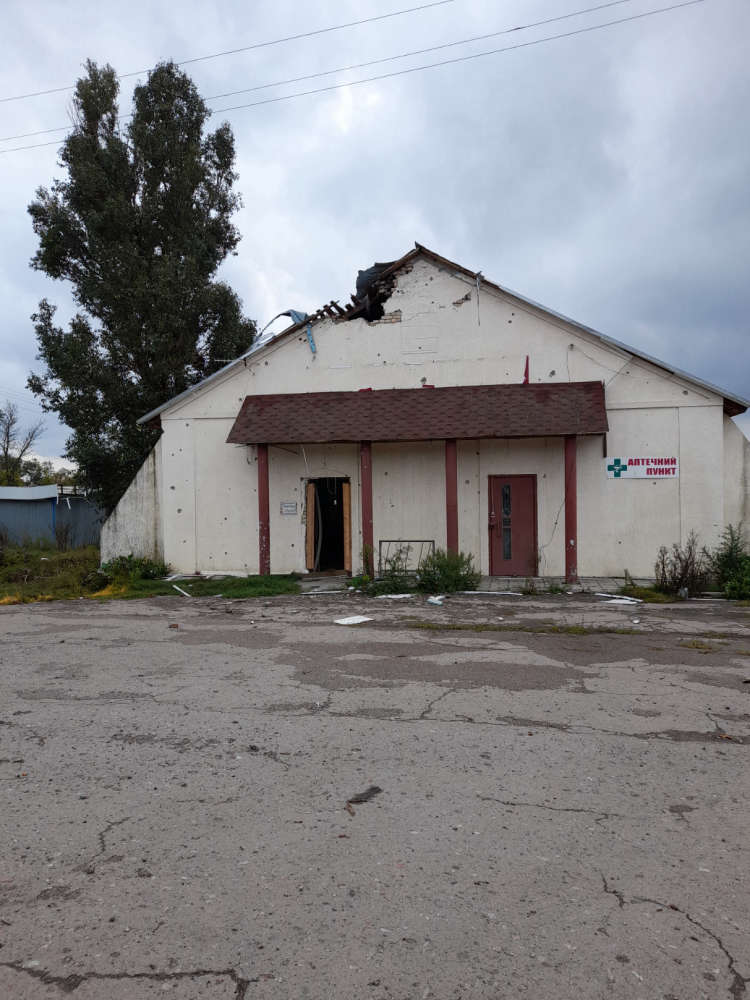
SCARS OF WAR: Villages to the east of Kharkiv had come under heavy shell fire, with many homes badly damaged
“It was heartbreaking,” says Val. “Just driving there took two hours, although it shouldn’t have, but the roads were full of craters, there was unexploded ordnance and burnt-out military vehicles on the sides of the roads. It was like a scene from Mad Max.
“It was very, very sad, little tiny villages, smaller than Hadfield, had been shelled – and probably 80 per cent of the properties had been damaged by shelling.
“What upset me was seeing ordinary private cars full of bullet holes. To me shelling is something that’s done from a distance, but this was up close and personal. The houses and cars were just riddled with bullet holes.
“At the first village we reached the only building we could use was an Orthodox, ornate church, so we set up our mobile clinic there. We were the first medical team people had seen for months and months.”
Most, Val said, were women and older people, many very poor and with chronic health conditions.
“It became clear there is a lot of poverty in that area and they were so pleased to see us.”
Val admitted it was a very emotional time and many tears were shed, but described Ukraine as a beautiful country with beautiful and a resilient people.
She eventually completed her tour of duty in the south west of the country teaching staff and students at Chernivtsi University, before having to face making a very emotional journey back home.
Adjusting to life after her experiences has not always been easy, and although she was delighted to be reunited with her dogs back home in Glossop, she says she would have no hesitation in returning to help again.
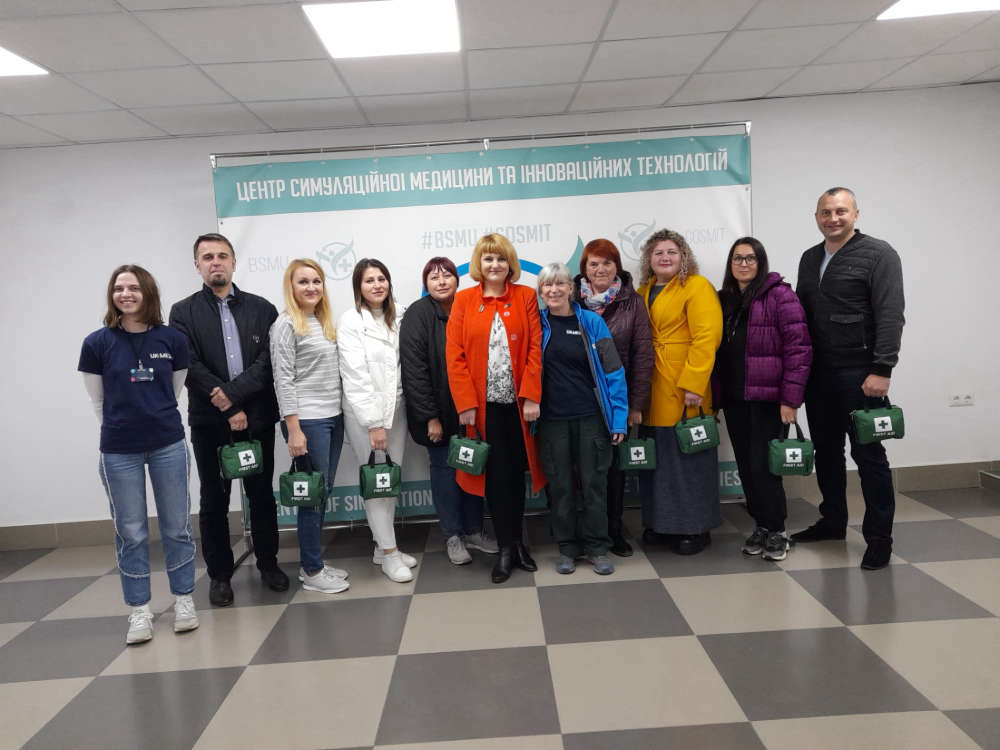
TRAINING: Chernivtsi University Medical School
You can listen to Val tell her story in her own words on The Reporter Show on Tameside Radio 103.6FM on Thursday (19 January) at 7pm.
Read more from the Glossop Chronicle
Click here for more of the latest news
Click here to read the latest edition of the paper online
Click here to find out where you can pick up a copy of the paper


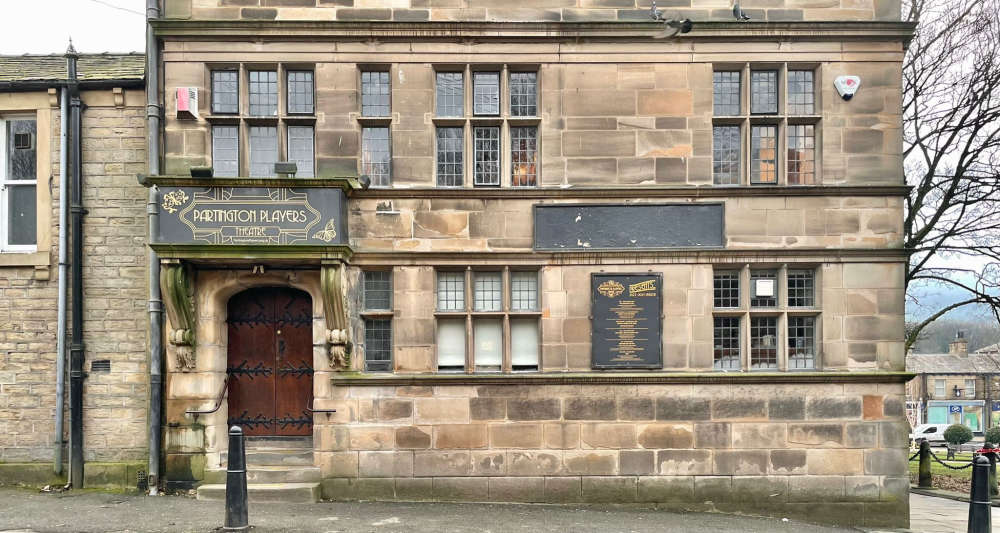 Partington Theatre is opening its doors to the public this Saturday
Partington Theatre is opening its doors to the public this Saturday
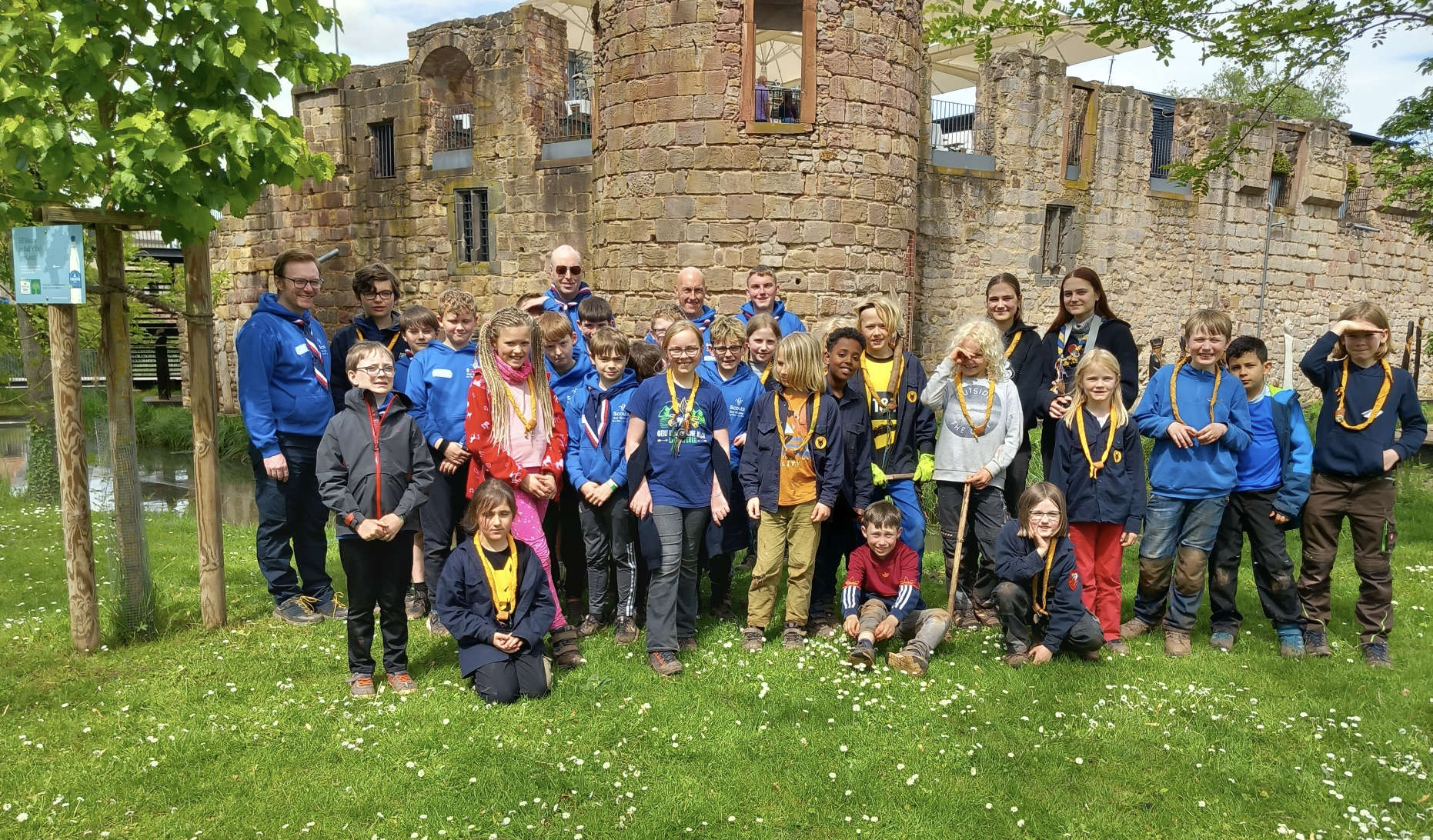 Cubs visit Glossop's twin German town for a long weekend
Cubs visit Glossop's twin German town for a long weekend
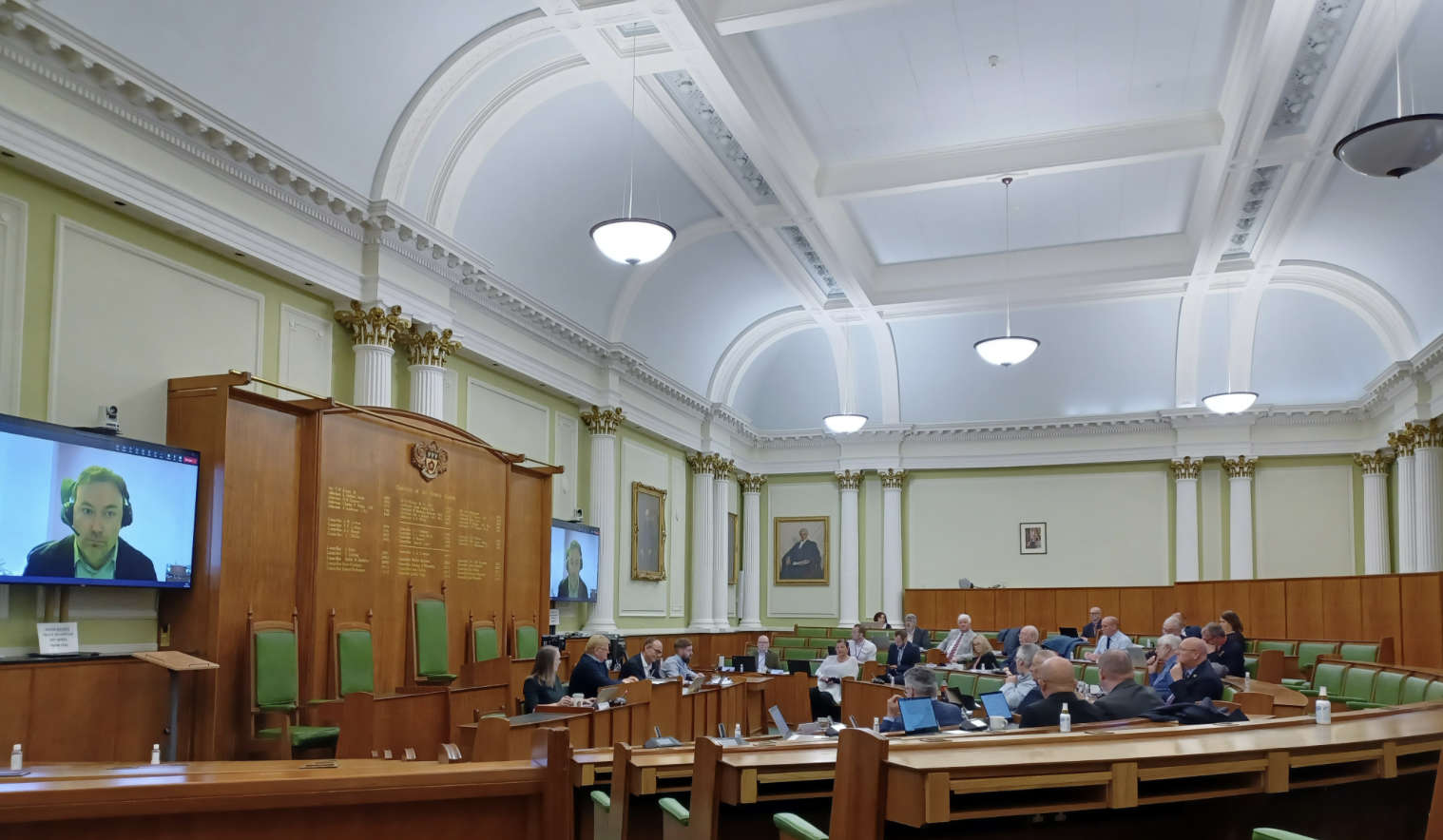 Council leader accused of “chucking his teddies out of the pram”
Council leader accused of “chucking his teddies out of the pram”
 Glossop author's first book becomes best-seller on Amazon
Glossop author's first book becomes best-seller on Amazon


